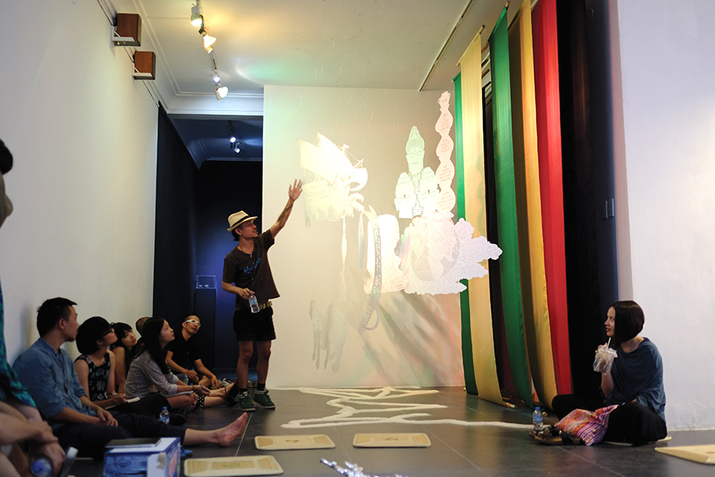
R
E
V N
E
X
T
Sàn Art Temporarily Ends Its Residency Program After Warning From Vietnamese Government
Sàn Art Laboratory Open Studio: artists of Session 4 shared their researches to visitors, 2014. Courtesy Sàn Art, Ho Chi Minh City.
On February 22, Vietnam’s leading nonprofit art space Sàn Art announced that it has been forced to temporarily end Sàn Art Laboratory, its studio and residency program that began in 2012. Due to the government’s ambiguous regulations, announced by the country’s Cultural Police (locally known as Phòng An ninh Chính trị nội bộ, or PA83), Sàn Art is now required to apply for licensing for having “foreign attendance” at its events.
According to Sàn Art, which is based in Ho Chi Minh City, there has been increased scrutiny of the organization’s Sàn Art Laboratory program since October 2015. Originally scheduled for November 2015, the group exhibition “Laboratory Session 7,” featuring performance and video works by residency artists Nguyen Thuy Tien and Vo Tran Chau of Vietnam and Indonesia’s Ratu Rizkitasari Saraswati, was ultimately scrapped due to government interference. This was a result of the Ministry of Culture, Sport and Tourism not having guidelines to approve performance art, but also Nguyen’s video work that shows the artist making soap, which the government deemed is not an artwork despite explanations from the Ho Chi Minh City Fine Arts Museum and the Ho Chi Minh City Fine Arts Association.
Other acts of censorship have affected the Laboratory program as of late, forcing Sàn Art to shift exhibitions to other venues or cancel the events altogether. This month, the exhibition “Howdy Cowboy,” for example, travelled to Toi Pōneke Arts Centre in Wellington, New Zealand, while local artist Lêna Bùi’s open studio and artist talk, scheduled to take place on January 29, was cancelled after the Cultural Police accused Sàn Art of not holding a license to have foreign people in the audience. Even the display of Lys Bui’s silkscreens was not given license as an exhibition at the Phuong My Flagship Store in Ho Chi Minh City. Sàn Art’s executive director and curator Zoe Butt stated to ArtAsiaPacific by email that the art space has never had to apply for a license for a local artist talk, adding that “It is incredibly difficult to raise funds for a program when you cannot make any of your events public, when you cannot promote your work.” Frequent phone calls and unannounced visits to Sàn Art have also been made by PA83, so much that the art space considers them an act of harassment. Sàn Art is seeking legal advice on the matter.
Butt speculates that this surge of government surveillance on Sàn Art’s programs could be attributed to a change in staff within the Cultural Police: “Our last seven years of operation has been relatively smooth, because we have had a working relationship with this bureau, but with staff change comes attitude differences. Obviously the new [officers] don’t understand contemporary art; and unlike before, they have no desire to really learn.”
Sàn Art is currently running “Laboratory Session 8,” which started in December 2015 and will go on until May. The organization has decided to temporarily cease the Sàn Art Laboratory program after this edition, in which time they will seek more clarification on the new regulations from the Cultural Police and the Ministry of Culture, Sport and Tourism. Butt explains that the latest acts of censorship has led to the need to restructure the program if it is to continue: “The decision to close the Laboratory program for now has come out of an ethical position. Our Session 9 was to focus on interdisciplinary experimental practice from Southeast Asia. If the Vietnamese Ministry of Culture cannot approve performance, and if they cannot understand that an artist’s video is actually ‘art,’ then it raises the question of how responsible Sàn Art is in establishing its program, when it is highly likely that censorship will occur again. Coupled with the fact that it seems any foreign participation and attendance of our activities is now under extra surveillance, it means our focus as an organization being a meeting place between local and overseas talent needs to be critically re-assessed.” Adding that, “The Sàn Art Board remains committed to the ‘Sàn Art Laboratory’ alumni and being a network of critical support (where we talk to them about their ideas and techniques) that facilitates opportunities at home and abroad.”
Sylvia Tsai is associate editor at ArtAsiaPacific.




